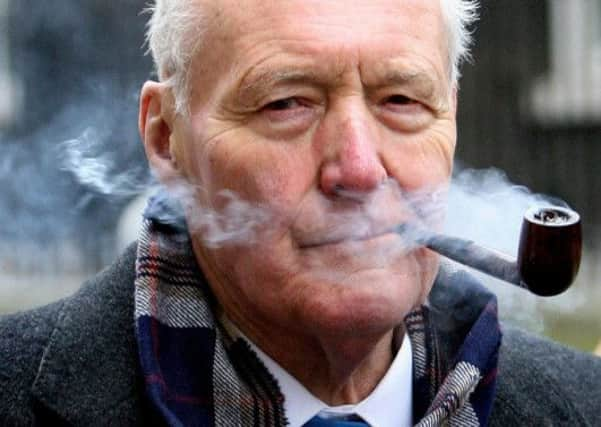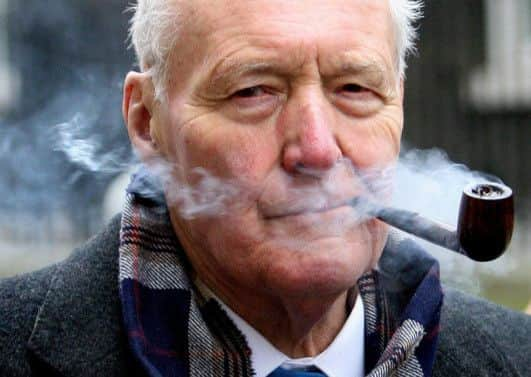Tony Benn: Labour bogeyman became iconic figure


Mr Benn, who was vilified by some in the 1980s as the figurehead of the Labour left but later enjoyed a status as a national treasure, was an MP for 50 years before retiring from parliament in 2001 to “spend more time with politics”.
Leading the tributes, Labour leader Ed Miliband described him as an “iconic figure” and said the party had lost a “champion of the powerless, a great parliamentarian and a conviction politician”.
Advertisement
Hide AdAdvertisement
Hide AdPrime Minister David Cameron said that Mr Benn ensured there was “never a dull moment”, even for those who disagreed with every word he said.


First elected to parliament in 1950, Mr Benn famously renounced a peerage in order to remain in the House of Commons and served in the cabinets of Harold Wilson and James Callaghan before staging a bitterly divisive battle with Denis Healey for the Labour deputy leadership in 1981.
As well as a politician, he was a famous diarist and journalist and after retiring from parliament staged a series of one man talk shows around the country.
Bolsover MP Dennis Skinner, a staunch Bennite in the 1980s, said: “He was one of the greatest assets the Labour Party ever had. He was a campaigner and a teacher. His whole idea was about trying to influence people, not just in parliament but outside too.”
Mr Benn, who remained a member of the Labour party despite disagreeing with its leadership, was a strong supporter of the party’s links with the trade unions, which were loosened earlier this month at a special conference.
TUC general secretary Frances O’Grady said: “Tony Benn was a friend and an inspiration to me personally and to the whole labour movement.”
Scotland’s First Minister, Alex Salmond, described him as an “outstanding figure whose career encompassed several political generations”.Mr Salmond continued: “Like many young parliamentarians I found Tony Benn supportive.”
CND general secretary Kate Hudson said: “Tony Benn was stalwart of the anti-nuclear movement, which underpinned so much of his political work.”
Advertisement
Hide AdAdvertisement
Hide AdFormer prime minister Tony Blair, whose reforms of the Labour Party took it away from the left, said: “Tony Benn was one of those rare things - a genuine radical. Even when I disagreed with him, I always had enormous respect for his passion.”
Former Tory prime minister Sir John Major said: “We would never share the same political philosophy, but he was a man for whom I had tremendous admiration, respect – and huge affection.”
Dennis Canavan: Tribute to Tony Benn
Tony Benn had a very unusual political journey. Most Labour MPs of his era moved from left to right during the course of their political careers but Benn moved in the opposite direction and, even after retirement, he seemed to get more radical with age.
He was a conviction politician, a man of principle, who had the courage to take up unpopular causes and the acumen to win debates, even if he did not always win the votes that followed.
He was also a gentleman, who articulated his case with sound logical arguments and respect for his opponents.
My first encounter with Tony Benn was sharing a platform with him at Bonnybridge Community Centre in 1974. I was a young rookie Labour candidate in my first ever Parliamentary contest.
Benn was Secretary of State for Industry in Harold Wilson’s Cabinet and he came to lend his support in my campaign.
The people of Bonnybridge gave him a rapturous welcome. At that time, the darlings of the left were Tony Benn and Michael Foot but they were bogeymen in the eyes of the Establishment.
Advertisement
Hide AdAdvertisement
Hide AdDuring that 1974 campaign, some of the landed gentry of rural Stirlingshire had signs erected on their estates with a skull and cross bones and the warning: “Beware! Foot and Benn Disease.”
Big business interests were not happy with Benn in charge of the Department of Industry and, in an effort to appease them, Wilson switched Benn to the relatively new Department of Energy.
It was the start of the North Sea Oil era and I was privileged to serve with Tony on the Parliamentary Committee which set up the British National Oil Corporation (BNOC).
Benn’s aim was to use public ownership to ensure that the benefits of North Sea Oil would not simply flow to multinational oil companies but would be shared by the people.
He also supported the idea of putting oil revenues into a special fund for future investment.
Unfortunately not everybody shared his vision.
The oil fund never materialised and an emasculated BNOC was finally abolished when Margaret Thatcher came to power.
Benn’s enemies were not confined to the Tory party.
Some of his fiercest critics were fellow Labour MPs who tried to undermine him with snide remarks like: “He’s far too left wing. He’s not one of us. He’s an aristocrat, the product of a posh fee-paying school.”
The truth is that, unlike some of his critics, he sent his own children to a comprehensive school.
Advertisement
Hide AdAdvertisement
Hide AdTony was a brilliant communicator who was at ease talking in Parliament or at an anti-war rally or in a humble miners’welfare club.
The working class loved him.
Trade Union leaders like Jimmy Reid and Mick McGahey were close comrades and, more importantly, he was hero-worshipped by rank-and-file miners and shipyard workers.
He was their voice, their champion, the greatest advocate of socialism in his time.
We’ll never see his likes again.
SEE ALSO: